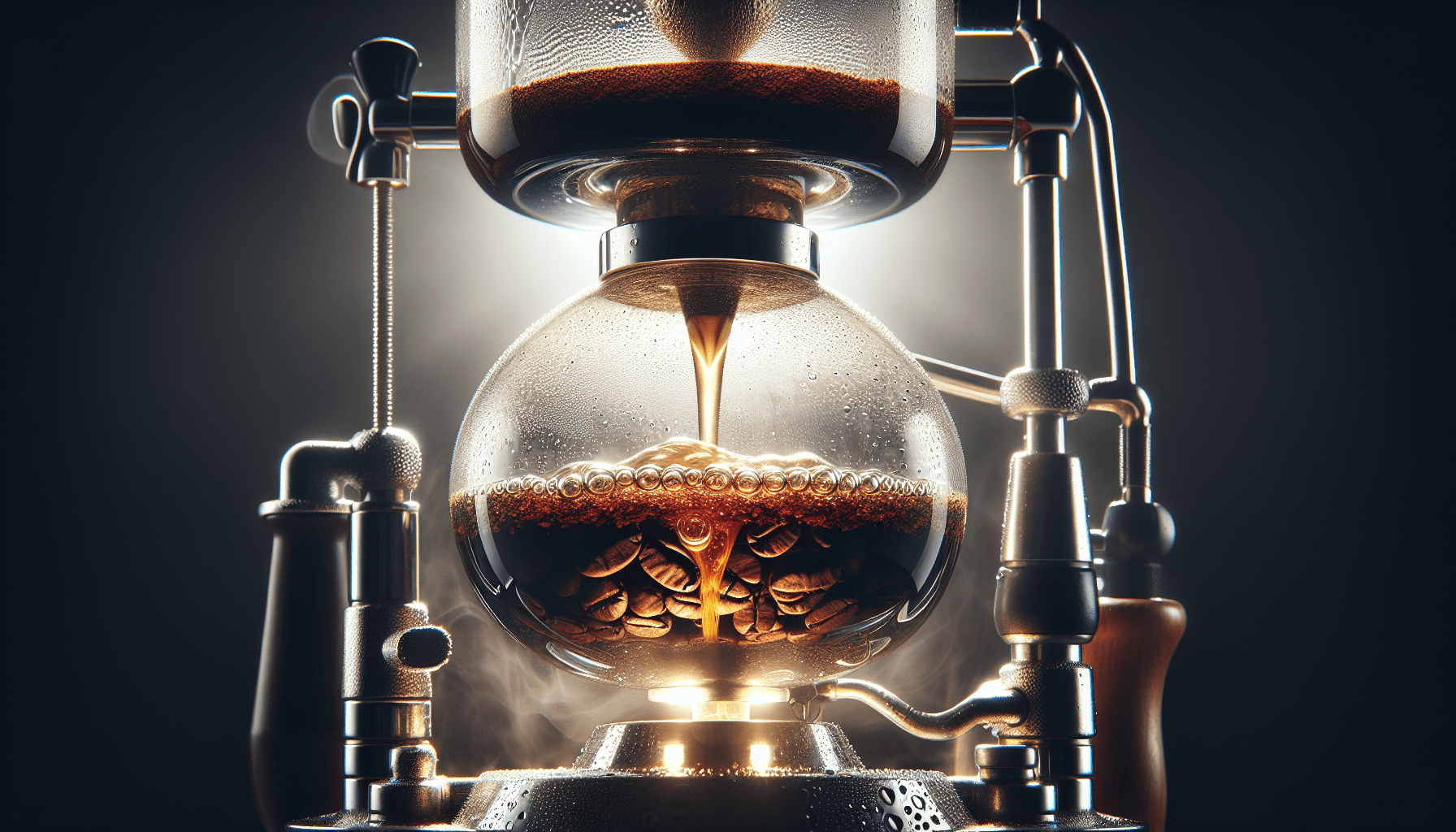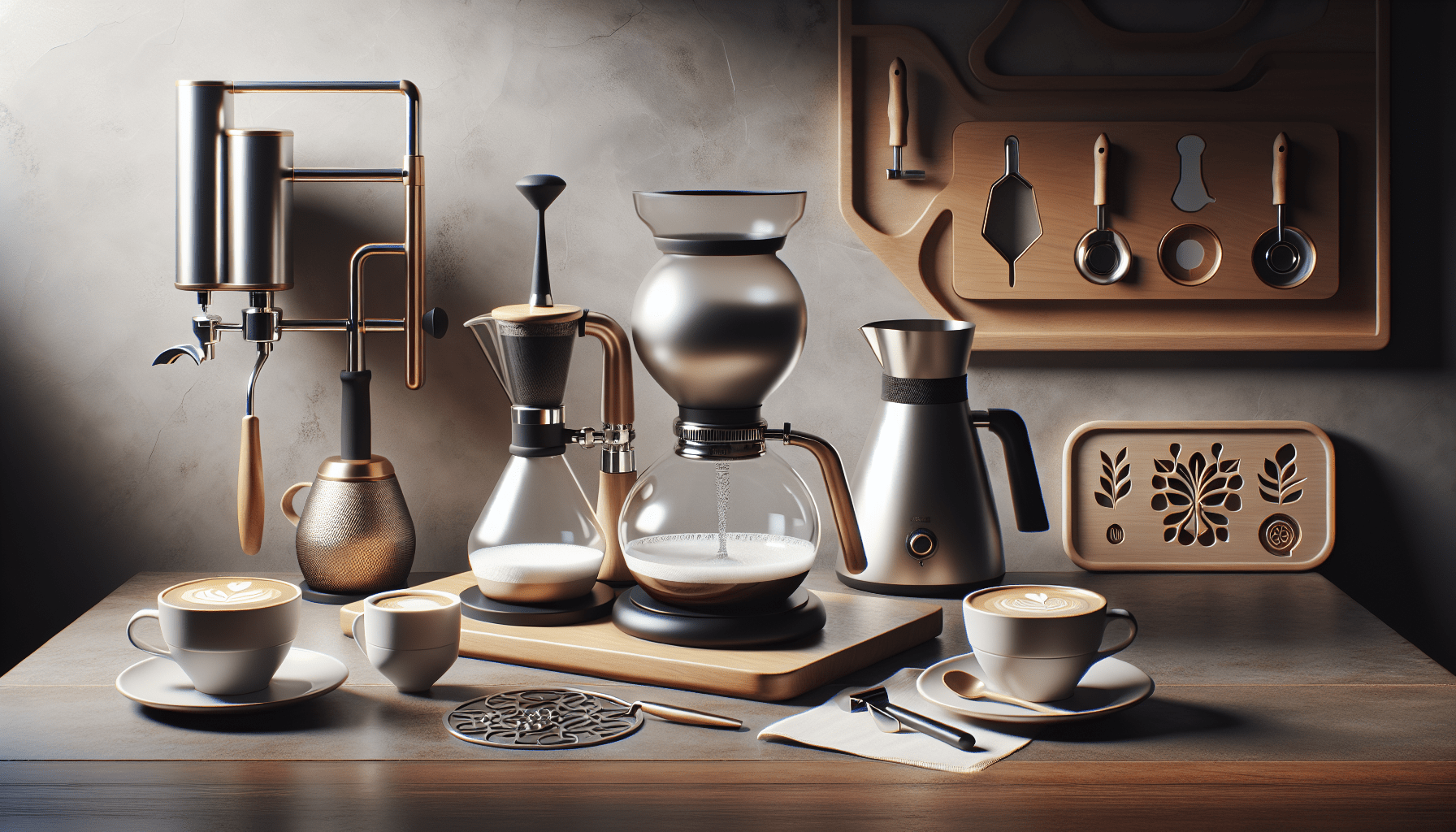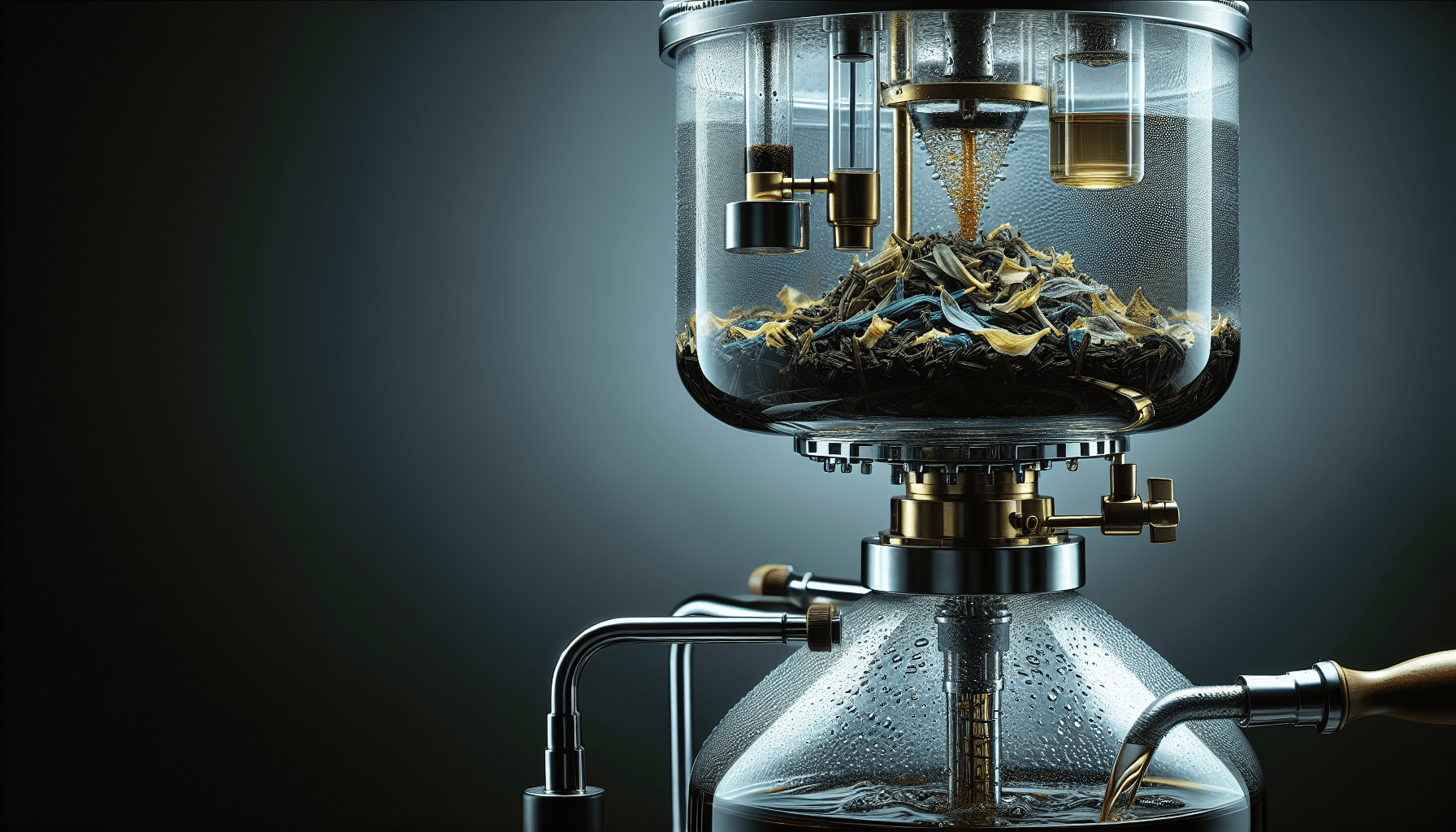If you’re a coffee enthusiast and love experimenting with different brewing methods, you may have come across the intriguing siphon coffee maker. With its unique design and captivating theatrical display, the siphon coffee maker has gained popularity among coffee lovers. But here’s a question for you – can you use any type of coffee bean with a siphon coffee maker? Well, in this article, we’ll explore the fascinating world of siphon coffee making and discover which types of coffee beans work best with this brewing method. So, grab your favorite mug and let’s get brewing!
Different Types of Coffee Beans
When it comes to coffee, the type of bean used plays a significant role in determining the flavor and aroma of the final cup. Here are some of the most common types of coffee beans used in brewing.
Arabica
Arabica beans are known for their delicate and nuanced flavors. They are often described as having a smooth and mellow taste with hints of fruit, chocolate, or nuts. Arabica beans are typically grown at higher altitudes, which helps develop their unique flavors. They are considered the standard for high-quality coffee and are widely used in specialty brews. If you prefer a more complex and nuanced cup of coffee, Arabica beans are an excellent choice.
Robusta
Robusta beans are known for their strong and bold flavors. They have a higher caffeine content and a more robust taste compared to Arabica beans. Robusta beans are often used in espresso blends and instant coffees due to their intense flavor profile. They are also more resistant to pests and diseases, making them easier to cultivate. If you enjoy a strong and full-bodied cup of coffee, Robusta beans are a great option.
Liberica
Liberica beans are less common and have a distinct flavor profile. They are often described as having a bold and floral taste with hints of fruity and woody notes. Liberica beans are grown in limited quantities, primarily in the Philippines and Malaysia. They are known for their large size and unique shape. If you’re looking to try something different and explore new flavors, Liberica beans offer a unique and adventurous experience.
Excelsa
Excelsa beans are a lesser-known variety but are worth considering for their unique taste. They are often described as having a complex flavor profile with notes of dark fruit, tartness, and a hint of roasted nuttiness. Excelsa beans are typically used in blends to add complexity and depth to the flavor. They are grown primarily in Southeast Asia. If you’re looking for a coffee bean that offers a different taste experience, Excelsa beans are worth a try.
Understanding Siphon Coffee Makers
Siphon coffee makers, also known as vacuum coffee makers or syphon brewers, are a unique and fascinating way to make coffee. They involve a two-chamber system where water is heated in a lower chamber, creating pressure that pushes the water upwards into an upper chamber where it mixes with coffee grounds. Here’s a closer look at how they work and the benefits they offer.
How a Siphon Coffee Maker Works
A siphon coffee maker consists of two main chambers, a lower chamber, and an upper chamber, connected through a tube or a glass rod. The lower chamber is filled with water, and the upper chamber holds the coffee grounds. As the water in the lower chamber is heated, it creates vapor pressure, forcing the water to rise into the upper chamber. This movement causes the coffee grounds to infuse with the hot water, creating a strong and flavorful brew. Once the heat is removed, the brewed coffee is pulled back down into the lower chamber, leaving the spent coffee grounds behind.
Benefits of Using a Siphon Coffee Maker
Using a siphon coffee maker offers several benefits that make it a popular choice among coffee enthusiasts. Firstly, the unique vacuum brewing process ensures that the coffee grounds are steeped evenly, resulting in a balanced and full-bodied brew. The visual aspect of the brewing process also adds to the overall experience, making it a great conversation starter when entertaining guests. Additionally, siphon coffee makers allow for precise control over brewing time and temperature, allowing you to tailor the brewing process to your preferred taste.
Factors to Consider When Using a Siphon Coffee Maker
While siphon coffee makers can produce exceptional brews, there are a few factors to consider for the best results. The grind size of the coffee beans is crucial, as it affects the extraction rate and overall flavor profile. The water temperature should be carefully monitored to ensure optimal brewing conditions. Additionally, experimenting with different brewing times and ratios can help you fine-tune your brew to match your taste preferences. With a bit of practice and experimentation, you’ll be able to master the art of siphon brewing.
Grinding Coffee Beans for Siphon Coffee
The grind size of your coffee beans plays a crucial role in the extraction process and the resulting flavor of your siphon coffee. Here’s why grind size matters and the recommended grind size for siphon coffee makers.
The Importance of Grind Size
Grind size is essential because it determines the surface area of the coffee exposed to the hot water during brewing. Different brewing methods require different grind sizes to achieve optimal extraction. For siphon coffee makers, a consistent and medium-fine grind is preferred. If the grind size is too coarse, the water will pass through the coffee too quickly, resulting in a weak and under-extracted cup. On the other hand, if the grind size is too fine, the water may struggle to pass through, leading to a bitter and over-extracted brew.
Recommended Grind Size for Siphon Coffee Makers
For siphon coffee makers, a medium-fine grind is recommended. The coffee grounds should have a consistency similar to granulated sugar or sea salt. This grind size allows for optimal extraction while still maintaining a clean and balanced cup of coffee. It’s important to use a burr grinder for a consistent grind size, as blade grinders can result in uneven grounds. Experimenting with slight variations in grind size can help you find the perfect balance for your taste preferences. Remember, the grind size may need to be adjusted depending on the specific siphon coffee maker and the brewing parameters you choose.
Flavor Profile and Siphon Coffee Makers
The flavor profile of your coffee is influenced by various factors, including the type of coffee beans used. Here’s how different coffee beans can affect the flavor of your siphon coffee and how to choose the right beans for your brewing method.
How Coffee Beans Affect Flavor
Coffee beans have a significant impact on the overall flavor of your brew. The type of bean, the origin, the roast level, and even the processing method can all contribute to the taste and aroma of the final cup. Arabica beans, with their delicate and nuanced flavors, tend to produce a more balanced and complex cup of coffee. Robusta beans, on the other hand, offer a stronger and bolder taste. By understanding the flavor profiles of different coffee beans, you can choose ones that complement the unique brewing process of a siphon coffee maker.
Matching Coffee Beans with Siphon Coffee Maker
When choosing coffee beans for your siphon coffee maker, it’s essential to consider the flavor profile you prefer. If you enjoy a bright and fruity cup, opt for a light to medium roast Arabica bean. The lighter roast will help preserve the delicate flavors and bring out the fruity and floral notes. For those who prefer a more robust and intense flavor, a darker roast or a blend with Robusta beans can provide the boldness you’re looking for. Remember to experiment with different beans to find the ones that best suit your taste preferences when brewed with a siphon coffee maker.
Experimenting with Different Coffee Beans
One of the joys of coffee brewing is the opportunity to experiment with different coffee beans and brewing techniques. Here are some tips for exploring the world of coffee beans and finding your preferred flavor with a siphon coffee maker.
Trying Various Coffee Beans
To truly understand the impact of different coffee beans on the flavor of your siphon coffee, it’s worth trying a variety of beans. Start by sampling different types of beans, such as Arabica, Robusta, Liberica, and Excelsa. Pay attention to the unique flavors and characteristics of each bean. Consider the origin, roast level, and processing method as you explore different coffee beans. Keep a record of the beans you try and note how they affect the taste of your brew.
Adjusting Ratios and Brew Parameters
In addition to trying different coffee beans, adjusting the brewing parameters can also have a significant impact on the flavor of your siphon coffee. Experiment with different water-to-coffee ratios, brewing times, and water temperatures to find the perfect balance for your taste preferences. For example, increasing the coffee-to-water ratio can result in a stronger and more intense cup, while brewing at a slightly lower temperature can bring out different flavors in the beans. Be open to trying different combinations to achieve the flavor profile you enjoy the most.
Finding Your Preferred Flavor
Through experimentation and exploration, you’ll eventually find your preferred flavor profile for siphon coffee. It may take some time and several cups of coffee, but the journey is part of the fun. Pay attention to the nuances in flavor, aroma, and mouthfeel as you try different beans and brewing techniques. Keep in mind that taste is subjective, and what works for one person may not work for another. Embrace the process of discovering your unique coffee preferences and enjoy the experience along the way.
Specialty Coffee and Siphon Coffee Makers
Specialty coffee beans offer a higher quality and unique taste experience. Here’s how specialty coffee can elevate your siphon brewing and some premium coffee bean options to consider.
Exploring Specialty Coffee Beans
Specialty coffee refers to coffee beans that have been graded and evaluated by professionals based on specific standards. These beans are grown in ideal conditions, carefully harvested, and meticulously processed to preserve their unique flavors. Specialty coffee often showcases complex flavors, distinct aromas, and exceptional quality. By using specialty coffee beans in your siphon coffee maker, you can heighten the overall brewing experience and discover new taste profiles.
Premium Coffee Beans for Siphon Brewing
When it comes to premium coffee beans for siphon brewing, the possibilities are endless. You can explore single-origin beans that offer a unique taste that reflects the specific region they come from. For example, Ethiopian beans may provide floral and fruity flavors, while Colombian beans may offer a balanced and rich taste. Additionally, consider experimenting with coffee beans from micro-lots or small-batch roasts. These beans are often sourced from specific farms or estates and can provide exceptional and exclusive flavors.
Enhancing the Siphon Brewing Experience
Using specialty coffee beans in your siphon coffee maker not only elevates the flavor but enhances the overall brewing experience. The attention to detail and craftsmanship that goes into specialty coffee production creates a sense of anticipation and excitement when brewing. Consider pairing your specialty coffee with a visually striking siphon coffee maker to create a visually stunning brew. The combination of the unique brewing method and the high-quality beans will take your coffee brewing to the next level.
Considerations for Using Unique Coffee Beans
While traditional coffee beans offer a wide range of flavors, there are some unique coffee beans worth considering for siphon brewing. Here are a few examples of unique coffee beans and the considerations when using them with a siphon coffee maker.
Aged Coffee Beans
Aged coffee beans are beans that have been stored for an extended period, typically in controlled conditions. This aging process can result in unique flavors and characteristics. When using aged coffee beans with a siphon coffee maker, it’s essential to adjust the brewing parameters accordingly. Aged beans often require longer brewing times and slightly higher water temperatures to fully extract their flavors. Experimenting with different ratios and brew times can help you find the perfect balance for your aged beans.
Flavored Coffee Beans
Flavored coffee beans come infused with various flavors like vanilla, caramel, or hazelnut, offering an additional layer of taste. When using flavored coffee beans with a siphon coffee maker, it’s important to consider the impact on the overall brew. Some flavors may overpower the natural flavors of the coffee, while others may complement and enhance them. Consider pairing flavored coffee beans with a siphon coffee maker that has a more robust flavor profile to ensure a balanced and enjoyable cup of coffee.
Novelty Coffee Beans
Novelty coffee beans refer to beans that have undergone unique processing methods or come from rare and exotic locations. Examples include beans that have been infused with alcohol, beans that have been fermented in different ways, or beans from remote and lesser-known regions. When using novelty coffee beans with a siphon coffee maker, it’s crucial to approach them with an open mind and a sense of adventure. Experiment with different brewing parameters and be prepared for unexpected flavors and tastes that these beans may offer.
Sourcing Coffee Beans for Siphon Brewing
Finding high-quality coffee beans for your siphon brewing can be an exciting endeavor. Here are a few options for sourcing coffee beans and some tips to help you make the best choice.
Local Coffee Roasters
Supporting local coffee roasters is a fantastic way to access freshly roasted coffee beans. Local roasters often have a range of specialty coffee options and can provide valuable insights into the flavor profiles of different beans. Reach out to your local coffee community, visit coffee shops, and attend events to discover local roasters in your area. By purchasing directly from local roasters, you can ensure the beans are fresh and have been carefully selected.
Online Specialty Coffee Retailers
Online specialty coffee retailers offer a wide selection of coffee beans from around the world. These retailers often work closely with coffee producers to source high-quality beans and can provide detailed information about the origin, processing method, and flavor profile of each bean. Reading customer reviews and checking for certifications such as Fair Trade or Rainforest Alliance can help you make informed decisions when purchasing coffee beans online.
Coffee Bean Selection Tips
When selecting coffee beans for siphon brewing, there are a few tips to keep in mind. Look for beans that have a roast date clearly labeled, as freshness is key to a great cup of coffee. Consider the origin and flavor profile that aligns with your taste preferences. If possible, purchase whole bean coffee and grind it just before brewing to maintain freshness. Experiment with different suppliers, origins, and processing methods to discover your favorite beans for siphon brewing.
Maintaining Your Siphon Coffee Maker
Proper maintenance of your siphon coffee maker is essential to ensure it continues to perform optimally and to prevent any contamination from different coffee beans. Here are a few tips on how to maintain your siphon coffee maker.
Regular Cleaning and Maintenance
Cleaning your siphon coffee maker after each use is crucial to remove any residue and oils that can build up over time. Disassemble the various components of the siphon, including the lower and upper chambers, and clean them thoroughly with warm soapy water. A gentle scrub with a brush can help remove any stubborn residue. Rinse all components thoroughly to ensure no soap or residue remains. Proper cleaning and maintenance will ensure the longevity of your siphon coffee maker and prevent any unwanted flavors or odors from affecting future brews.
Avoiding Contamination from Different Coffee Beans
To avoid contamination when switching between different coffee beans, it’s important to thoroughly clean the siphon coffee maker between uses. While some residual flavors may remain with certain beans, proper cleaning will minimize any carryover. The best practice is to dedicate specific beans to different siphon coffee makers if you have multiple devices or to thoroughly clean and rinse the siphon before switching between different beans. This will help ensure your brews maintain their intended flavors and prevent any unwanted cross-contamination.
Final Thoughts
Siphon coffee brewing offers a unique and flavorful experience that can be further enhanced by using different coffee beans. Whether you prefer the delicate nuances of Arabica beans or the boldness of Robusta, there is a wide range of coffee beans available to suit your taste. By understanding the impact of coffee beans on flavor and exploring different brewing techniques, you can create your perfect cup of siphon coffee. Remember to experiment, keep an open mind, and enjoy the process of discovering your preferred flavor profile. With a little practice, patience, and a reliable siphon coffee maker, you can elevate your coffee brewing routine and savor delicious cups of coffee every time.




